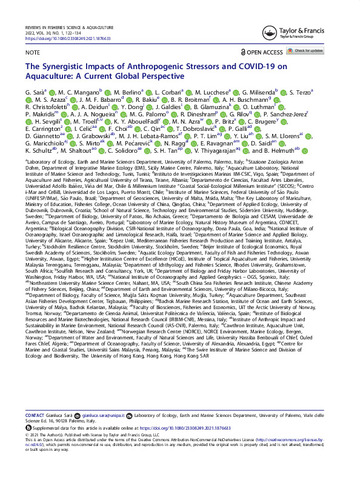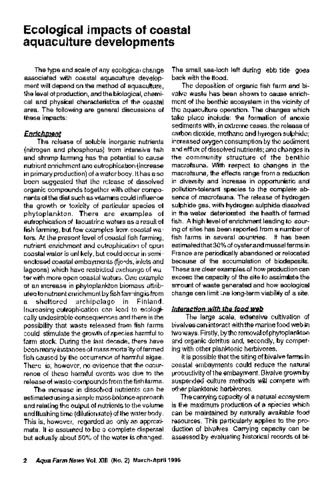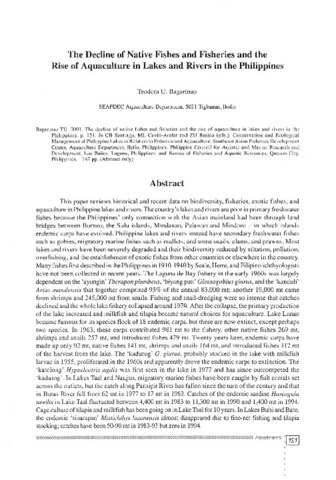The synergistic impacts of anthropogenic stressors and COVID-19 on aquaculture: A current global perspective

Associated URL
www.tandfonline.comDate
2022-01-02Author
Page views
643Metadata
Show full item recordCited times in Scopus
Share
Abstract
The rapid, global spread of COVID-19, and the measures intended to limit or slow its propagation, are having major impacts on diverse sectors of society. Notably, these impacts are occurring in the context of other anthropogenic-driven threats including global climate change. Both anthropogenic stressors and the COVID-19 pandemic represent significant economic challenges to aquaculture systems across the globe, threatening the supply chain of one of the most important sources of animal protein, with potential disproportionate impacts on vulnerable communities. A web survey was conducted in 47 countries in the midst of the COVID-19 pandemic to assess how aquaculture activities have been affected by the pandemic, and to explore how these impacts compare to those from climate change. A positive correlation between the effects of the two categories of drivers was detected, but analysis suggests that the pandemic and the anthropogenic stressors affect different parts of the supply chain. The immediate measurable reported losses varied with aquaculture typology (land vs. marine, and intensive vs. extensive). A comparably lower impact on farmers reporting the use of integrated multitrophic aquaculture (IMTA) methods suggests that IMTA might enhance resilience to multiple stressors by providing different market options under the COVID-19 pandemic. Results emphasize the importance of assessing detrimental effects of COVID-19 under a multiple stressor lens, focusing on areas that have already locally experienced economic loss due to anthropogenic stressors in the last decade. Holistic policies that simultaneously address other ongoing anthropogenic stressors, rather than focusing solely on the acute impacts of COVID-19, are needed to maximize the long-term resilience of the aquaculture sector.
Description
Suggested Citation
Sarà, G., Mangano, M. C., Berlino, M., Corbari, L., Lucchese, M., Milisenda, G., Terzo, S. M. C., Azaza, M. S., Babarro, J., Bakiu, R., Broitman, B., Buschmann, A., Christofoletti, R., Deidun, A., Dong, Y., Galdies, J., Glamuzina, B., Luthman, O., Makridis, P., ... & Helmuth, B. (2022). The synergistic impacts of anthropogenic stressors and COVID-19 on aquaculture: A current global perspective. Reviews in Fisheries Science & Aquaculture , 30(1), 123-135. https://doi.org/10.1080/23308249.2021.1876633
Subject
Collections
- AQD Journal Articles [1249]
Except where otherwise noted, this item's license is described as Attribution-NonCommercial-NoDerivatives 4.0 International
Related items
Showing items related by title, author, creator and subject.
-
Ecological impacts of coastal aquaculture developments
Southeast Asian Fisheries Development Center, Aquaculture Department (Aquaculture Department, Southeast Asian Fisheries Development Center, 1995)The study presents the type and scale of any ecological change associated with coastal aquaculture development. These are enrichment, interaction with the food web, oxygen consumption, disturbance of wildlife and habitat ... -
The decline of native fishes and fisheries and the rise of aquaculture in lakes and rivers in the Philippines
Bagarinao, Teodora (Aquaculture Department, Southeast Asian Fisheries Development Center; Philippine Council for Aquatic and Marine Research and Development (PCAMRD), Department of Science and Technology; Bureau of Fisheries and Aquatic Resources, 2001)This paper reviews historical and recent data on biodiversity, fisheries, exotic fishes, and aquaculture in Philippine lakes and rivers. The country's lakes and rivers are poor in primary freshwater fishes because the ... -
The features of inland fisheries in Southeast Asia
Muthmainnah, Dina; Makmur, Safran; Rais, Aroef Hukmanan; Sawestri, Sevi; Supriyadi, Freddy; Fatah, Khoirul (Inland Fishery Resources Development and Management Department, Southeast Asian Fisheries Development Center, 2019)Numerous bodies of inland waters are widely spread in Southeast Asia where fisheries production is an important source of people's animal protein. The capture fisheries sector, utilizing the inland waters, provides employment ...




